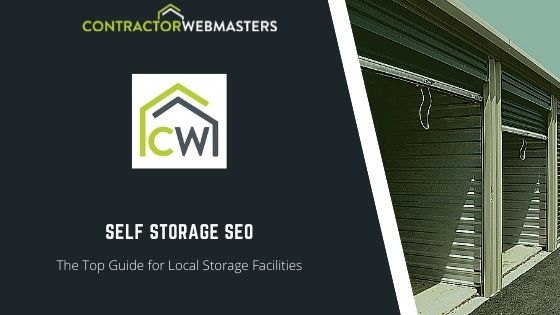
Self Storage SEO is the optimization of your self-storage facility website and Google Business Profile for search rankings. Because organic Google clicks are “free,” SEO yields the highest marketing ROI of any strategy. Still, it’s essential to understand why self-storage SEO is vital for your business.
SEO is essential because 97% of consumers research local businesses online. SEO is even more critical for self-storage businesses because self-storage is very much a local business. People who need storage aren’t likely to be looking at facilities two counties over.
In the following post, Contractor Webmasters outlines some tips and basic principles of SEO for storage companies to utilize this highly effective digital marketing method to benefit your business.
Website Optimization
The backbone of self-storage SEO is keyword research. You have to know which keywords your target audience is using most to look for the services you offer. You can use many good keyword research tools to identify your target terms and phrases.
Once you have a list of self-storage-related keywords, you need to optimize your website with them. We mean to use them in the written copy of your website. Here are some of the most important places to use these keywords:
Page Title
Include the relevant keyword in the page title if you create your website on WordPress or another publishing platform. Title tags should be the same as your H1, which Google sometimes automates as your title.
Headings
Include target keywords in your written content’s headings (H1’s and possibly H2’s). As we noted, your H1 and title tag should be identical. However, you’ll also want to insert keywords and variations into your sub-headings, especially H2s, towards the top of the page.
Meta Description
A meta description tells search engines and users what the page is generally about and may show up in your website’s listing when it appears on search engine results pages.
Including your keyword in the meta description will make it much more likely that your site will rank high when someone uses that keyword.
Written Content
Web crawlers will also scan the body of your written content, so make sure that you insert the keyword into the copy in a natural, human-readable way.
Remember that Google and other search engines may penalize your rankings for keyword stuffing – cramming in keywords frequently and unnaturally to manipulate the search engine results.
Content Strategy
Developing a content strategy for a small self-storage company could be a challenge. For this, we would recommend simply starting a blog. Blog posts are a great medium to target informational intent key phrases. Take a look at other content strategies below:
Service Pages
Users will often search for specific storage-related services on Google. For example, a keyword like boat storage receives over 14,000 monthly searches. As a result, you should publish an individual service page built around this keyword and provide details about your facility’s boat accommodations.
Other examples of service pages are business storage, RV storage, and climate-controlled storage. You can also run your competitor’s websites through keyword research tools to see other services that they rank for online.
Blog Posts
Publishing blog content on your website will open up target keywords and backlinking opportunities. We would recommend writing blog content with a local bent for self-storage companies.
People who need storage are often in the process of moving, so writing about the local neighborhoods, schools, community events, or locally relevant topics may be an excellent way to create engagement online.
Keyword Targeting
It’s also an intelligent strategy to structure blog posts around the target keywords. For instance, “affordable self-storage” can prompt a post that discusses the average price of self-storage in your area and what typically affects the price of self-storage rates.
Off-Site Optimization
Off-site optimization refers to SEO efforts you make outside of your website. For example, your Google Business Profile is critical to your SEO strategy. Still, it is a separate entity from your website.
Off-Page is a reasonably general term that covers a variety of tactics – the most important being:
Review Management
Online reviews are critical in the modern era. For this reason, you must ensure your company is present on review sites like Yelp, Bing for Business, and Google Business Profile. Once you have registered, be sure to reply to customer reviews (good or bad) as much as possible.
Link Building
Performing link outreach is a solid SEO tactic because it drives ranking improvements. However, your link-building tactics must abide by Google’s guidelines. The best way to earn links is to create valuable and linkable content.
In addition, you can try registering with local business networks, reaching out to your suppliers, and signing up for professional directories.
Social Media Marketing
Your company must be on social media platforms like Facebook, Instagram, and YouTube. That is how another large contingent of consumers learn about local businesses.
Focus on quality over quantity when you post to your social media outlets. Think about the concerns and needs of your target audience and come up with posts that speak to those needs.
Local Search Engine Optimization
Last but not least is Local SEO for storage companies. There is a sub-branch of SEO known as Local SEO, which specifically focuses on making your website and company more visible online to people in your area.
There are multiple ways to drive local traffic to your web properties. We will outline the most effective methods below.
Google My Business
Your Google Business Profile (formerly Google My Business, i.e., GMB) is a powerful business listing that can appear on local search results for various keywords. In addition, Google shows a box called the Local Map 3-Pack for local queries like self storage near me.
Optimize your profile by verifying your address, adding unique photos of your staff and facility, and creating FAQ content to answer common customer questions. Also, respond to any Google reviews on your profile.
DataPins
Reviews and reputation are critical elements of Local SEO. So naturally, you want to drive Google reviews to your business profile. Still, you also want to get reviews on additional platforms like Yelp and Facebook.
You can use the best reputation management tool for storage companies, DataPins. The DataPins tool automates review requests through email and text messages. In addition, it allows you to pin your location for various customers.
Location Pages
Your website can contribute to your Local SEO presence and local landing pages. These pages target multiple cities and towns within your service area.
For example, suppose your facility is within 20-minute driving distance to numerous cities. In that case, you should create a location page for each zip code. Also, create unique content for each city page to rank well.
Taking The Next SEO Steps in 2023
SEO is complex and requires a full-time effort to outrank competitors. As a result, it’s ideal to hire an SEO agency to handle your optimization efforts. Contractor Webmasters specializes in SEO for storage facilities.
Our solutions include DataPins, a proprietary software tool, and a plugin that enhances every aspect of your Local SEO. Furthermore, Contractor Webmasters creates a custom website with unique content, on-page SEO, and off-page SEO. Get in touch with us to learn more about our services.


